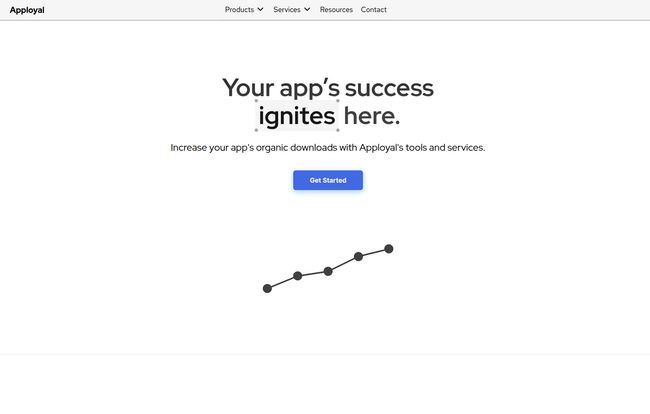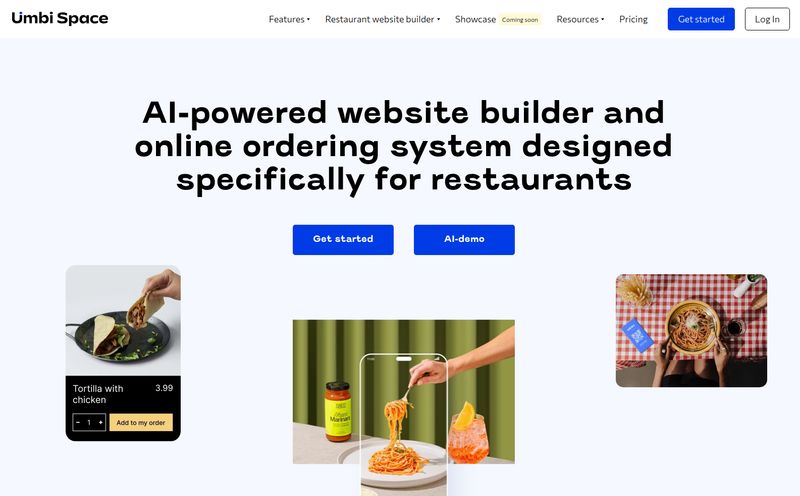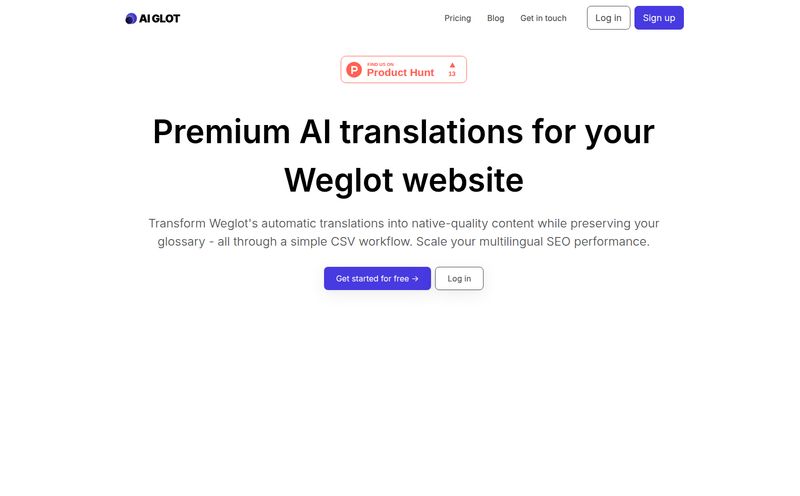If you're an app developer, especially an indie dev or part of a small team, you've probably had the dream. The dream where your app goes global, tops the charts in Japan, becomes a household name in Brazil, and gets rave reviews in Germany. Then you wake up and remember the reality: localization is a monster. It's expensive, it's time-consuming, and managing string files across twenty languages can make you want to throw your laptop out the window.
For years, the choice has been pretty grim: either cough up a small fortune for a professional translation agency or cross your fingers and dump your text into Google Translate, hoping it doesn't turn your carefully crafted onboarding into complete gibberish. So, when I stumbled across a platform called Apployal, my curiosity was definitely piqued. They're making some big promises about using AI to make localization and App Store Optimization (ASO) affordable and easy. But as someone who's been in the SEO and traffic-gen game for years, I know promises are cheap. So, I decided to take a closer look.
So, What's the Big Idea Behind Apployal?
At its core, Apployal is trying to solve that classic developer headache. They offer a suite of tools and services built around one central idea: using AI to automate the tedious parts of taking your app global. We're not just talking about translating your app's internal text—the `strings.xml` or `Localizable.strings` files that make developers groan. They go further.
They’re targeting the whole package: the text inside your app, the marketing copy on your App Store and Google Play pages, and even the text embedded within your Figma design files. That last one is a pretty neat touch. How many times have you had to manually recreate translated mockups? It’s a pain. Apployal aims to be a one-stop-shop for companies and lone wolves who don't have a dedicated localization department on speed dial. It's all about streamlining the path from a single-language app to a global contender.

Visit Apployal
Breaking Down the Apployal Toolkit
Apployal isn't just one thing; it's a collection of different tools and services. It feels like they've looked at the entire app-to-market pipeline and picked out the most annoying bottlenecks to fix. They’ve split their offerings into AI-powered products and more traditional, human-led services, which I think is a pretty smart move.
The AI-Powered Translators: Your Multilingual Robot Interns
This is the heart of the platform. The AI translators are designed for speed and efficiency. The Mobile App Translator hooks directly into your workflow, apparently with GitHub integration, to handle your string files. That means less manual exporting and importing, which is a huge win. Then there's the App Store Page Translator, which focuses specifically on your public-facing descriptions, keywords, and update notes. This is critical for ASO, as localizing your store listing is one of the fastest ways to boost international downloads.
And, as I mentioned, the Figma Translator is a clever addition. It helps you visualize your app in different languages right from the design stage. It’s like having an assistant who’s not only a polyglot but also half-decent with design software. Pretty cool.
When You Need a Human Brain: Pro Services
Here’s where Apployal shows some real market awareness. They know that AI, for all its power, isn't perfect. We've all seen hilarious—and sometimes disastrous—machine translation fails. Culture, slang, and nuance are incredibly difficult for an algorithm to grasp. It's like trying to explain sarcasm to a calculator.
So, they also offer Professional Mobile App Localization and App Store Optimization (ASO) as services. This feels like a safety net. You can use the AI for a fast, 80-90% solution, and then bring in their human experts to handle the final polish, check for cultural appropriateness, and perform deep-dive keyword research that an AI might miss. It’s a hybrid approach that, in my opinion, makes a lot of sense.
A Few Handy Extras
Tucked away in their offerings are a couple of other tools like an API Monitor and an App Icon Resizer. These aren't groundbreaking on their own, but their inclusion shows that the Apployal team understands the developer ecosystem. They're not just a translation company; they're building tools for app creators. It's a small thing, but it builds trust.
The Good, The Questionable, and The AI-Generated
Alright, no tool is perfect. Let's get into what I genuinely like and what gives me a bit of pause.
On the plus side, the affordability and scalability are huge. By using AI, they're making localization accessible to developers who were previously priced out of the market. This could genuinely help a fantastic indie app find a new audience. The speed is another obvious benefit. In the fast-moving app world, being able to deploy a localized update in days, not weeks, is a significant competitive advantage. And I can't say enough about the integrations. A tool that doesn't fit into my existing workflow (hello, GitHub) is a tool I probably won't use for long.
But there are some question marks. My biggest one is about the AI itself. The site mentions “advanced AI technologies,” but that’s a bit vague for my taste. Are we talking about a fine-tuned version of GPT-4, a proprietary model, or something else? As a professional in this space, I want to know what’s under the hood. The quality of the translation is entirely dependent on the quality of teh model, and without more details, we're left to just trust them on that.
This leads to the next point: the undeniable need for human review. Apployal seems to acknowledge this by offering their professional services, but any user going for the AI-only tools needs to understand this. You can't just blindly trust the output for every language, especially for clever marketing copy or culturally specific phrases. The AI is a powerful starting point, not a magic wand.
So, How Much Does This Cost? The Pricing Mystery
Here’s the part that might frustrate some folks. If you go looking for a pricing page on Apployal's website, you won’t find one. In fact, when I was digging around, some of the links led to a 404 page, which gave me a little chuckle. Instead of a neat little table with tiers and prices, they have a "Reach out to us for a free quote" approach.
I have mixed feelings about this. On one hand, custom quotes can be great. It means you're not paying for features you don't need, and the pricing can be tailored to your exact project size. It makes sense for a service that can scale from a tiny app to a large business.
On the other hand, it's a barrier. As a busy developer or marketer, sometimes I just want to see a number. I don’t want to have to fill out a form and wait for a sales call just to find out if a tool is in my budget. I've always preferred transparent pricing, but I get why a B2B service-oriented company might go this route. Just be prepared to have a conversation to get the numbers.
Who Is Apployal Really Built For?
After looking at everything, a clear picture of the ideal Apployal user emerges.
- Indie Developers & Small Studios: This is the sweet spot. If you're a small team with a great app but a limited budget, Apployal could be the key to punching above your weight in international markets.
- Agile Startups: Companies that need to move fast and test new regions without committing to a massive, long-term localization contract.
- Marketing Managers: A marketing lead who wants to quickly localize an app's store listing for an ASO boost in a new country could get a lot of value here.
Who is it not for? Probably massive enterprise corporations that already have multi-million dollar contracts with huge, traditional localization firms and deeply entrenched workflows. Though, even their teams might find the AI tools useful for rapid prototyping.
Frequently Asked Questions
How accurate is Apployal's AI translation?
While AI has gotten incredibly good, it's best to think of it as a near-fluent junior translator. For technical text and simple UI instructions, it's likely very accurate. For creative marketing copy, slogans, or culturally sensitive content, you should always plan on having a native speaker review it. Apployal seems to support this with their professional services.
Can I use Apployal just for App Store Optimization?
Yes. Apployal offers ASO as a standalone service. You could use them to research keywords and rewrite your app store descriptions for different regions without touching the translation of the app itself.
Does Apployal integrate with GitHub?
Yes, they highlight GitHub integration as a feature. This is a major benefit for development teams, as it allows for a more automated and less error-prone process of updating language files in your codebase.
Is Apployal free?
The core services are not free. They operate on a quote-based pricing model. However, they do offer some free tools like the App Icon Resizer, which is a nice bonus for the community.
How is this different from just using Google Translate?
The difference is in the workflow and focus. Apployal is a specialized tool built for the app development process. It handles specific file formats (like string files), integrates with developer platforms (like GitHub), and translates content in context (like App Store pages and Figma designs). It’s an end-to-end solution, not just a raw translation engine.
What is Figma translation and why do I need it?
Figma is a popular design tool used to create app mockups. Figma translation allows you to see how your app's design looks with translated text directly in your design files. This is important because text length varies wildly between languages—a button that looks perfect in English might look broken when the German text is 50% longer. It helps you catch design issues before you even start coding.
My Final Take on Apployal
So, what's the verdict? I've gotta say, I'm optimistic. Apployal is stepping into a space that has been ripe for disruption for a long time. They’re not just selling AI; they're selling a smarter workflow. The blend of AI-powered speed and optional human oversight is the right approach for this problem.
It's not a magical solution that removes all effort from localization, and anyone who tells you such a thing exists is selling you snake oil. But it is a powerful tool that could seriously level the playing field. In a world where the App Store is more crowded than a rush-hour train, discoverability is a constant battle. Smart, efficient localization isn't just a nice-to-have anymore. It's a survival tactic. And for the scrappy developer trying to make a mark, a tool like Apployal might just be the advantage they need.



